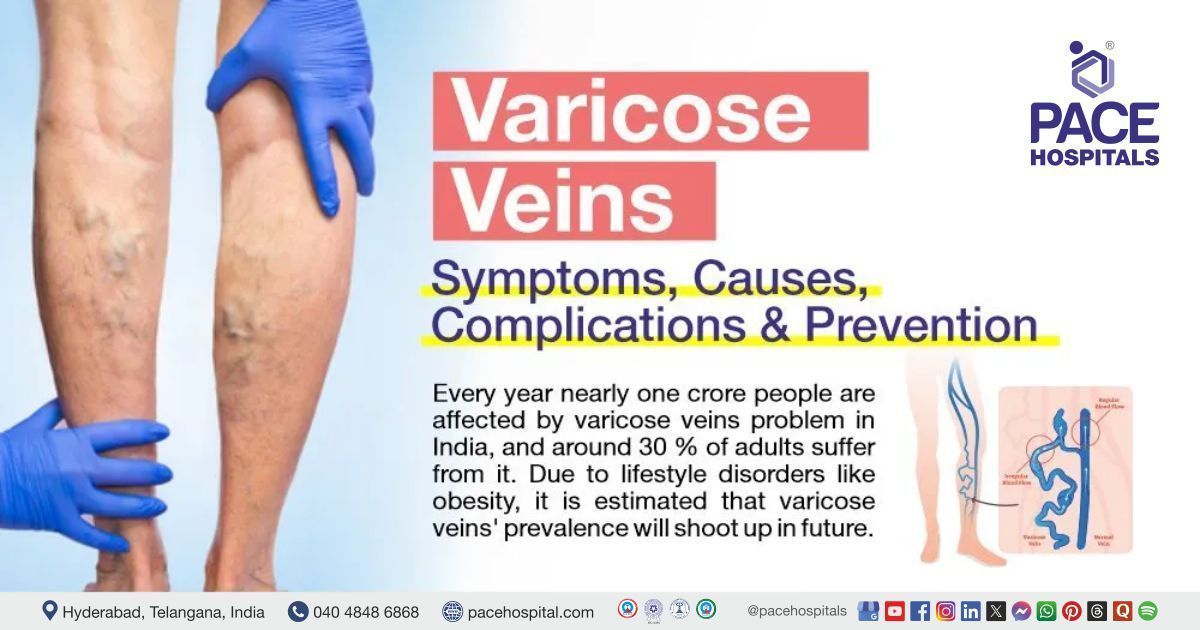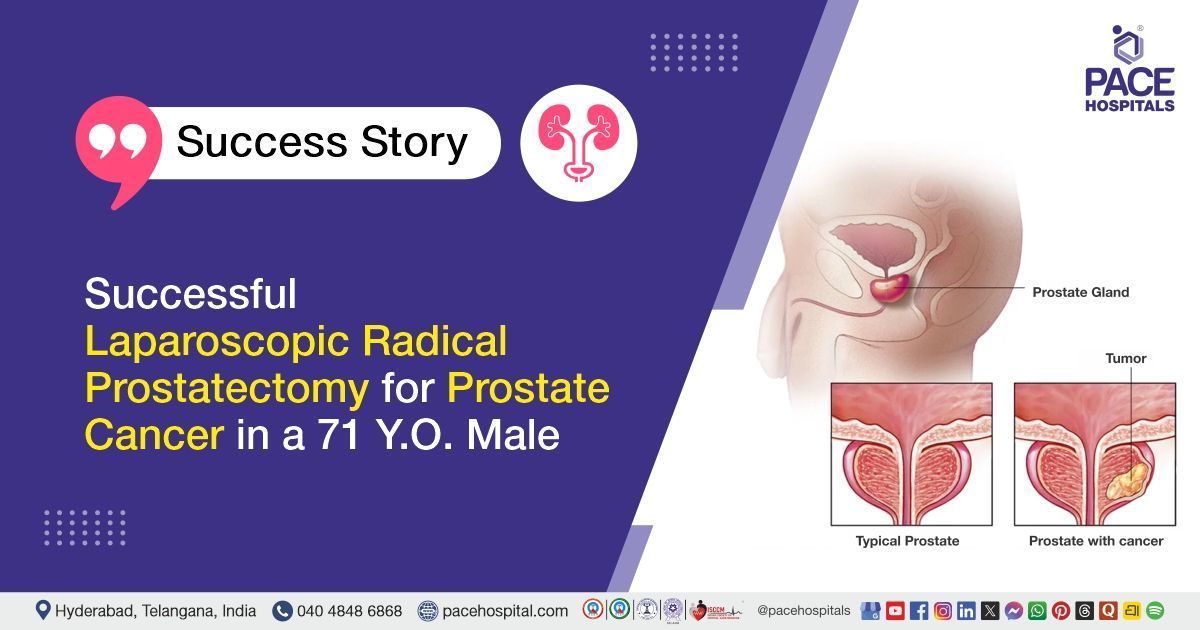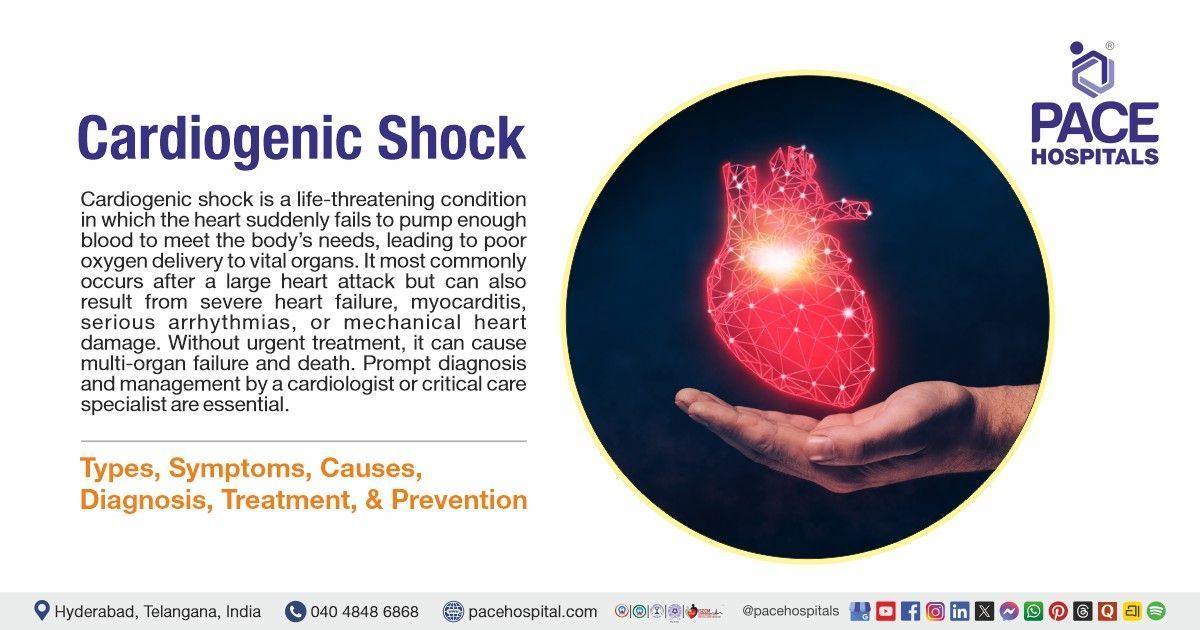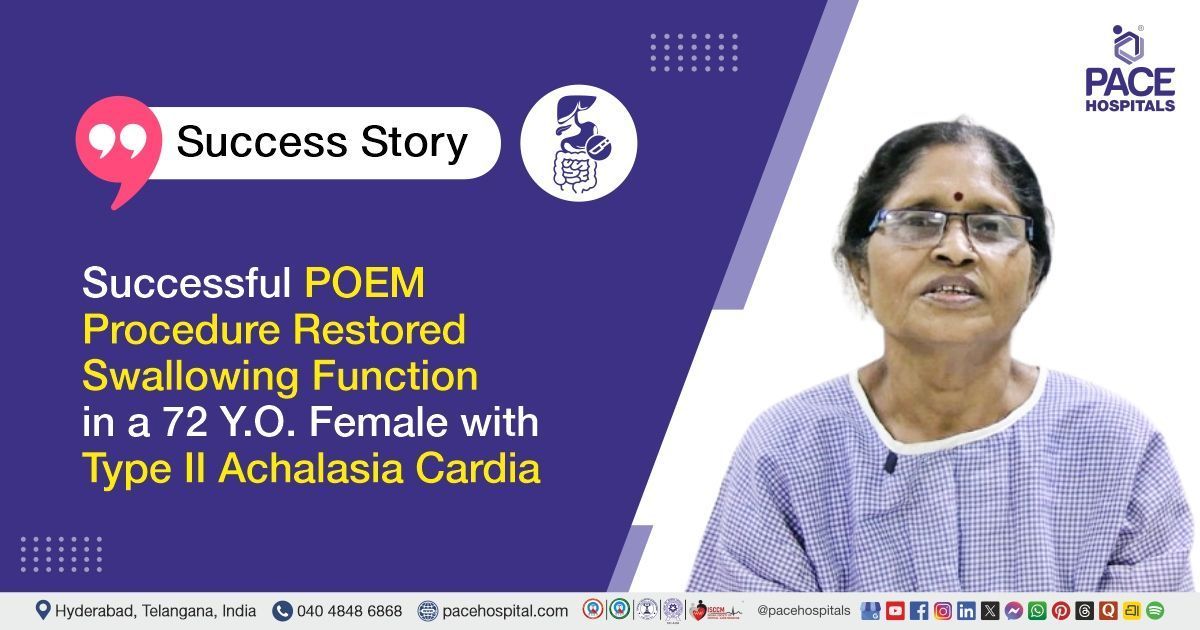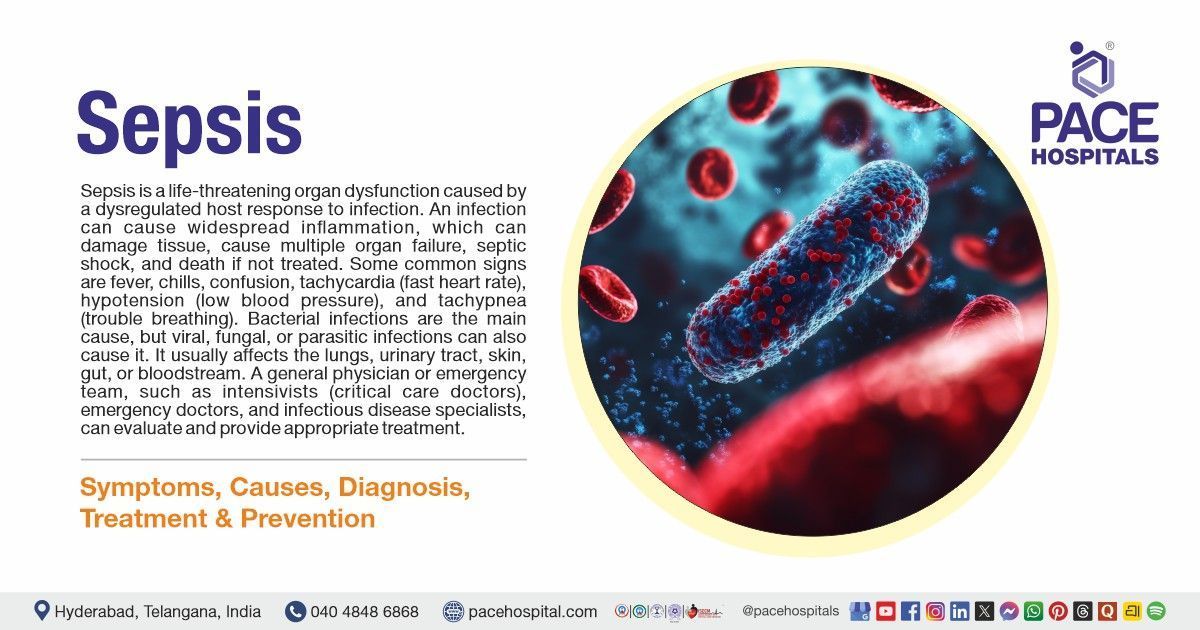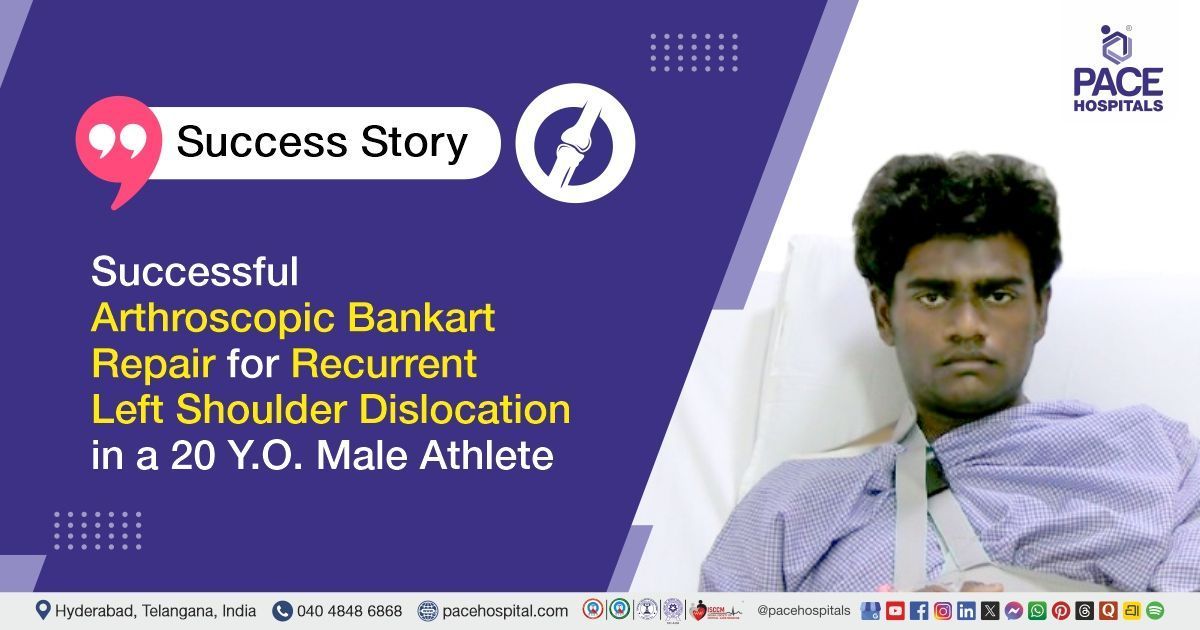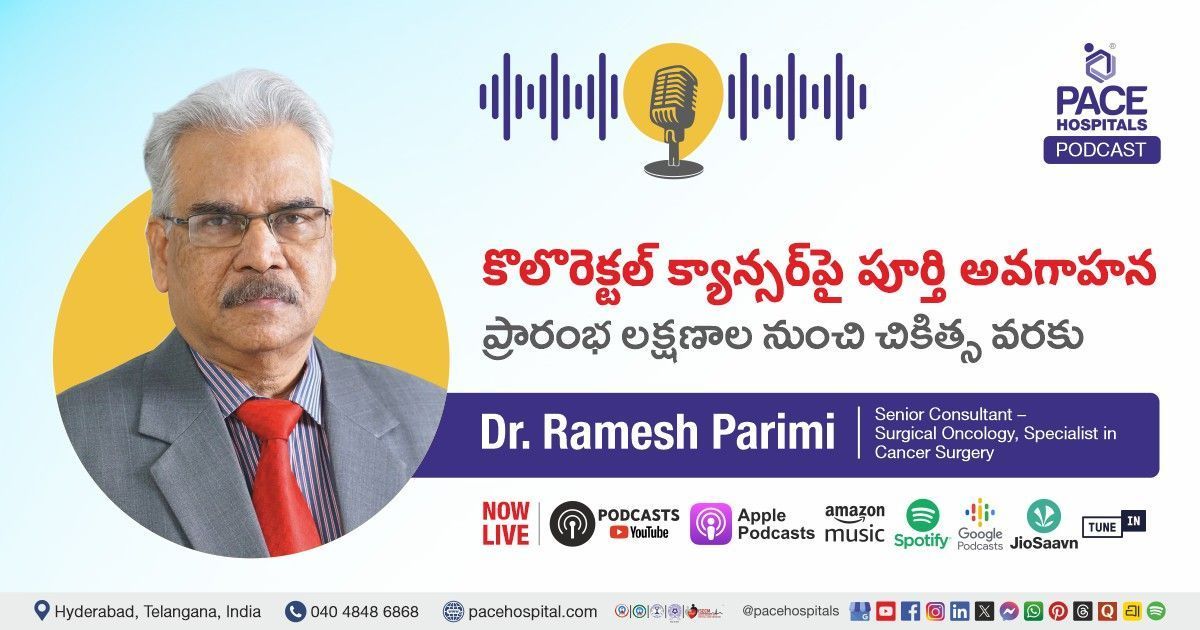Varicose Veins – Symptoms, Causes, Complications and Treatment
PACE Hospitals
What are Varicose Veins?
Varicose Veins Meaning
Veins are tubular channels which carry blood back from the body to the heart. When these veins become swollen (greater than 3 mm) and twisted, they are called varicose veins. Although they can occur anywhere in the body, they are more common in the legs.
The word "varicose" comes from the Latin, resembling the word "twisted". These veins may occur in clusters that look like spider webs. A single large vein can also be readily visible, especially when standing.
Up to 20% of the adult population has some form of varicose veins. They appear between the ages of 30 and 70 and usually get worse with age. Unlike in western countries, varicose veins are more common in males in India.
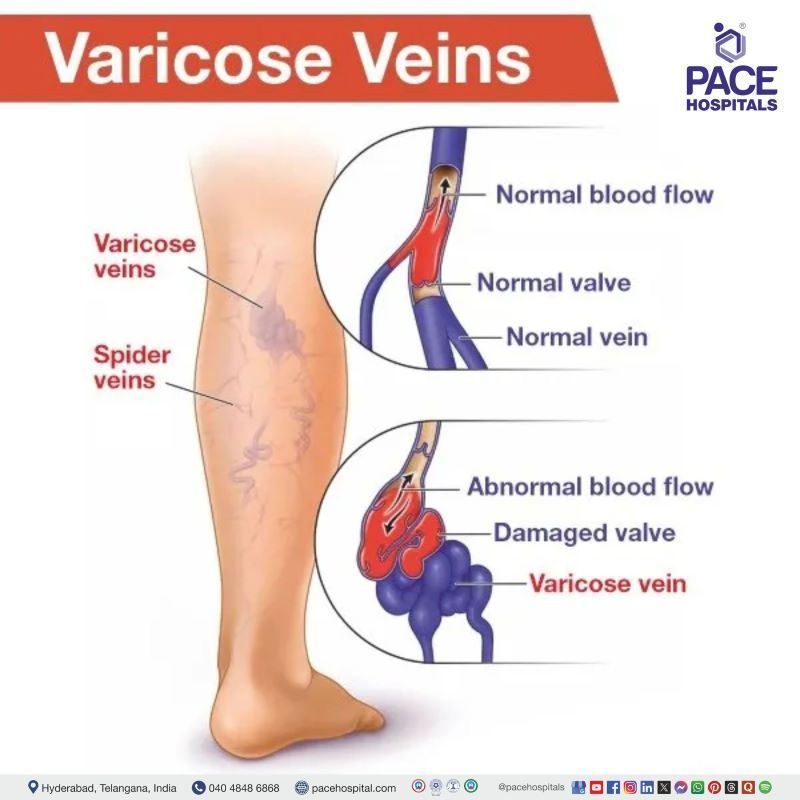
Types of Visible Veins
There are various kinds of visible veins apart from varicose veins.
- Telengiectasias: These are also called spider or thread veins which are smaller (less than 1 mm) and closer to the skin. These are red or blue in colour and are commonly seen in legs or face.
- Corona phlebectatica: These are also smaller veins distributed in a fan shaped pattern. These are commonly seen around foot and ankle.
- Reticular veins: These are larger than the previously described veins (1-3 mm) and closer to the skin. These are usually blue in colour. Reticular veins spread in a mesh pattern and cover a larger skin area.
Difference between Varicose Veins and other Visible Veins
The other visible veins are primarily a cosmetic problem. Most are painless and generally do not cause other health problems. In contrast, varicose veins are not always just a cosmetic problem. It may affect your life and can lead to serious health problems.
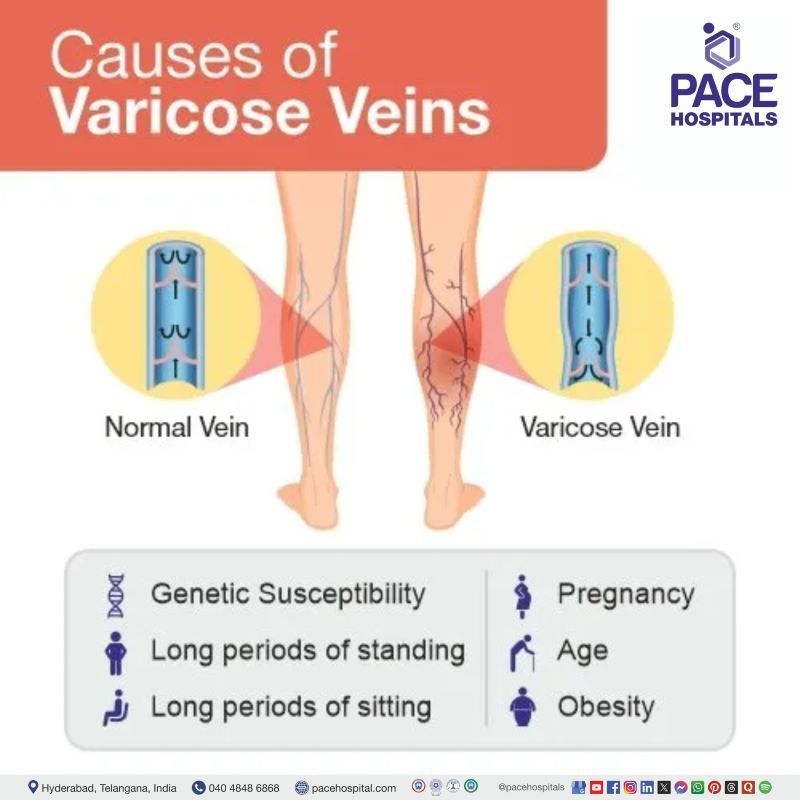
Causes of Varicose Veins
Varicose veins develop due to increased pressure in the veins that damages the venous wall or valves (cup shaped membranes which prevent blood from sliding back). These faulty valves make veins more prone to pooling of blood, a condition where pumping of blood back to the heart is ineffective and collects in the legs, ankles, and feet. Some of the risk factors that contribute to increased venous pressure or valve damage are as follows:
Medical history of blood clotting: Clotting of blood can damage vein walls or valves leading to the development of varicose veins.
Prolonged standing or cross-legged sitting: Sitting cross-legged or standing for long periods continuously can increase venous pressure, thus causing varicose veins.
Obesity: Being overweight or a person with a BMI (body mass index) of more than 26 can put more pressure on your veins and can cause varicose veins.
Pregnancy: Changes during the pregnancy can increase the risk of varicose veins. The weight of the growing baby puts pressure on the large blood vessels in the pelvis, altering blood flow and the raised blood volume can also enlarge the veins making pumping of blood back to the heart inefficient.
Prolonged exposure to sunlight: Excessive sun exposure can break down the collagen in your skin and weaken your blood vessels, resulting in varicose veins.
Ageing: Most people who develop varicose veins are between 40 and 80.
Medicines: Taking prolonged hormonal replacement therapy or oral contraceptive usage may also increase the risk of varicose veins.
Family history: If there is a family history of varicose veins, then the possibility of developing varicose veins will be very high.
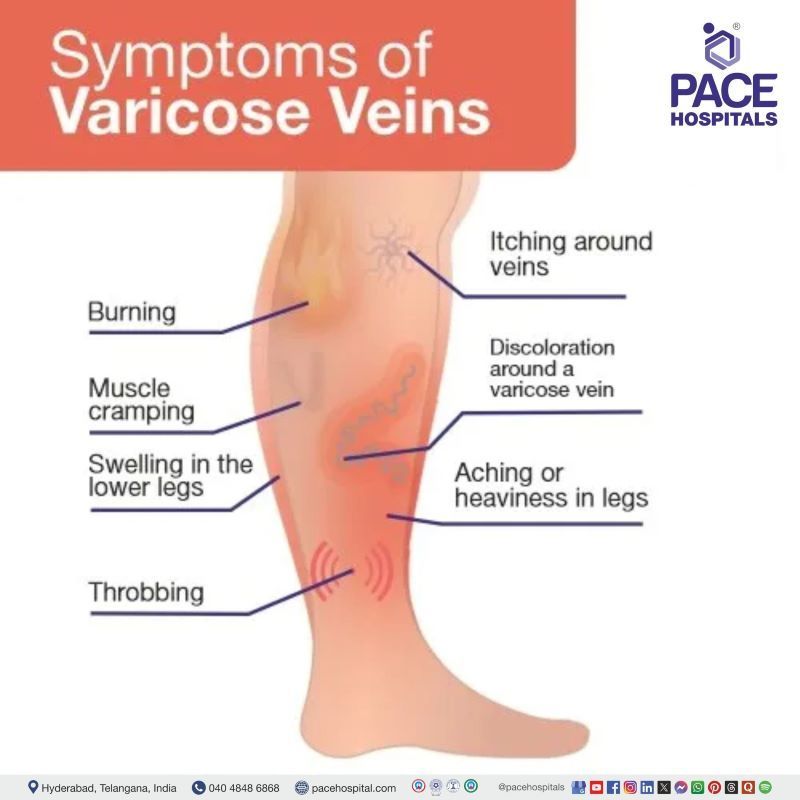
Symptoms of varicose Veins
Usually, people don't show symptoms from varicose veins, except that they are conspicuous and embarrassing to look at. Varicose veins can worsen over the years, but this often progresses very slowly.
In addition to cosmetic embarrassment, the most common symptoms of varicose veins are:
- Pain in the affected area, especially after sitting or standing for long periods
- Dry, cracking, itchy skin around affected veins
- Throbbing or cramping in legs during rest
- Discolouration of the skin around the ankle
- Heaviness in legs, muscle fatigue
- Bulging of affected veins
- Leg swelling
- Varicose Eczema: Eczema may be familiar, but varicose Eczema would not be a popular term around us. It is a kind of Eczema that causes the skin on your legs to become itchy, red, and scaly and is at risk of peeling off, especially after contact.
- Lipodermatosclerosis: It is the medical name for skin scarring caused by varicose veins. It develops gradually over the years and can lead to venous ulcers if left untreated.
Complications of Varicose Veins
Many people who suffer from varicose veins never experience any problems and do not need treatment. They can manage their symptoms daily without needing treatment. However, if complications do occur, they should be treated as soon as possible. It may take years for these complications to develop.
Complications that can occur with the progression of varicose veins symptoms are as follows:
Bleeding: In the case of varicose veins in the legs, these delicate veins can bleed easily if facing circumstances like hitting the leg against a surface, bruising, or being cut from participating in sports. If untreated in these patients, bleeding can be challenging to stop.
Thrombophlebitis: Thrombophlebitis is medical terminology for venous inflammation due to blockages or blood clots. This inflammation causes swelling and pain in the affected area. The affected leg will have a reddish appearance and feels warm to the touch.
Pulmonary Thromboembolism: When the blood clot in the varicose vein breaks and migrates in to the lung veins it is called pulmonary thromboembolism. This can lead to breathlessness and decreased oxygen in the blood. If severe, this can be life-threatening.
Venous Ulcer: These are ulcers that occur on the lower part of the leg. It happens because of the increased pressure and swelling of damaged veins that release fluid into the skin. This fluid collects under the skin, making it thick, rough, and inflamed. This skin breaks down and forms ulcers. These ulcers usually occur around the ankle.
Diagnosis of Varicose Veins
Diagnoses of varicose veins is based on it's appearance that the diagnostic process basically include physically examination by primary care physician followed by few diagnostic tests to assess the complications developed due to severity of varicose veins.
Some of the physical examination done are:
- Examining the veins and its surrounding areas
- Checking for the symptoms like swelling, heat, or redness
- Checking the pulse close to varicose veins to confirm the proper blood flow
Some of the diagnostics test done to diagnose the severity of varicose veins are:
- Ultrasound scan (Doppler or Duplex scan): To check the structure and functionality of vein walls and valves.
- Complete Blood Count (CBC): This test is done on the blood taken from the veins to understand the infection caused due to varicose veins.
Varicose Veins Treatment
When it comes to varicose veins treatment, there are many treatment options available based on the condition of the patients and the severity of the disease. If the patient medical condition is not fit for the definitive treatment, few conservative treatment options are recommended to manage and relieve the symptoms.
Some of the conservative treatment options are:
- Compression stockings
- Lifestyle changes
- Medicines
Based on the diagnosis and severity, definitive treatment options are recommended. Traditional surgeries and minimally invasive techniques/procedures are available to treat varicose veins.
Some of the minimally invasive procedures to treat varicose veins are:
- Endovenous Laser Ablation Therapy
- Radiofrequency Ablation
- Microwave Ablation
- Sclerotherapy
- Superglue
- MOCA
- Varithena
- Steam
- The V-Block
- LAFOS
Why Choose PACE Hospitals?
Expert Super Specialist Doctors
Advanced Diagnostics & Treatment
Affordable & Transparent Care
24x7 Emergency & ICU Support
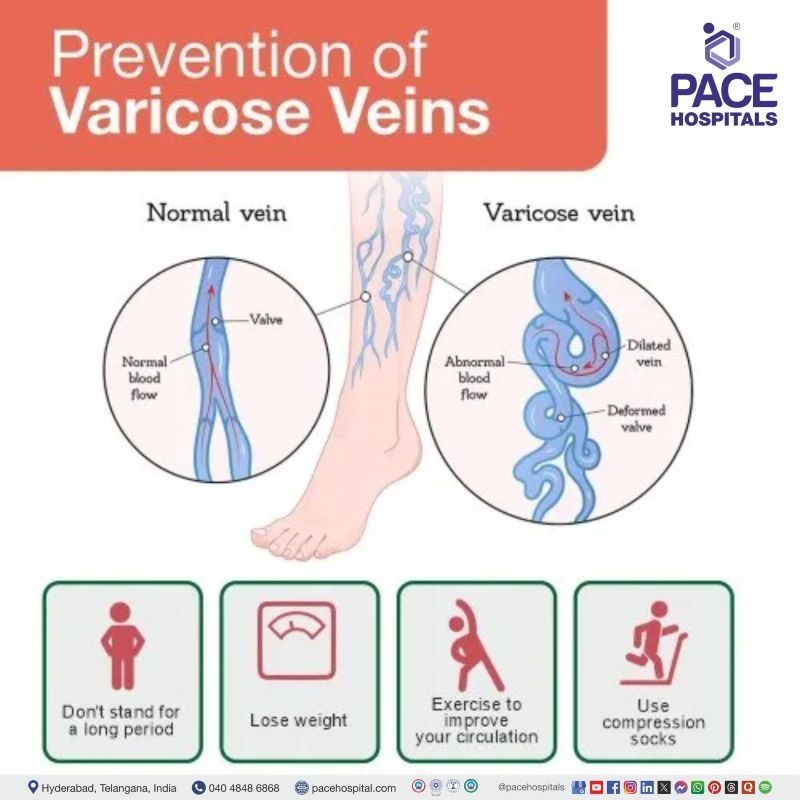
Prevention of Varicose Veins
Varicose veins do not get cured on their own. To some extent, it could be helpful to adopt a few lifestyle habits to increase blood flow from legs. As a result, you can keep your varicose veins under control, so they don't get worse.
Some of the lifestyle changes for the prevention of varicose veins are as follows:
- Do not stand for long periods.
- Take care of BMI (body weight) to lessen the pressure on the leg veins.
- Indulging in regular exercise to strengthen the veins, circulation and leg strength.
- Avoid cross legging while sitting, and make a habit of raising your legs when resting.
- Wear compression stockings to improve circulation
Frequently Asked Questions (FAQs) on Varicose Veins
How to cure varicose veins permanently?
Varicose veins cannot be cured permanently. But the damaged veins can be treated so that blood flow through the normal veins can be improved. After treatment, the development of new varicose veins can be prevented by some measures as mentioned.
Are varicose veins dangerous?
If progressing varicose veins are neglected, this can lead to some complications like clot formation in the veins, infection of the local site, bleeding from the varicose veins, and migration of clot from the varicose veins to lung vessels.
When to worry about varicose veins?
When certain symptoms related to varicose veins start developing, like swelling in the legs, leg pain, or skin changes (discoloration, itching, hardening), then you need to consult the doctor.
Can varicose veins be cured?
Varicose veins cannot be cured completely, but the symptoms related to varicose veins can be effectively treated and the complications can be prevented.
Can varicose veins go away?
They cannot go away on their own. But with treatment, their size can be significantly reduced.
Is walking good for varicose veins?
Yes, walking and other forms of exercise like cycling help improve the blood flow from the legs, which helps in preventing the onset, progression, and recurrence of varicose veins.
Does running cause varicose veins?
Running does not result in varicose veins in those who don't have them. But in patients who already have varicose veins, they can sometimes experience a worsening of symptoms. This can be avoided by taking precautions such as running on soft surfaces, wearing running shoes, and wearing compression stockings.
Which doctor to consult for varicose veins?
Worldwide, varicose veins are generally treated by interventional radiologists and vascular surgeons.
Can low blood pressure cause varicose veins?
Low blood pressure is not recognised as a risk factor for varicose veins. However, large varicose veins can lead to pooling of blood and thus may result in low blood pressure.
How to get rid of varicose veins during pregnancy?
Pregnant women are more prone to developing varicose veins because of hormonal factors and the growing uterus pressing on the veins. Hormonal factors play a major role rather than the pressure of a growing uterus as these are more commonly seen during the first three months of pregnancy. Varicose veins during pregnancy can be prevented by some measures like avoiding prolonged sitting or standing, avoiding cross-legging, sleeping towards the left side (to decrease pressure on veins), avoiding tight clothes, and wearing compression stockings.
Are varicose veins a sign of heart disease?
Varicose veins are not directly a sign of heart disease. Artrerial disease is commonly associated with heart disease rather than venous disease. If untreated varicose veins are complicated by the formation of clots in the veins and if these clots migrate to lung veins, this can indirectly increase the workload of the heart and can cause heart problems.
Do varicose veins hurt when touched?
Uncomplicated varicose veins are not painful to touch. When these veins become infected, they can be painful to touch.
Does varicose veins cause infertility?
Varicose veins are the twisted, swollen veins commonly seen on the legs. If the scrotal (scrotum is the pouch which contains testicles) veins become swollen and twisted, this condition is called varicocele. Varicose veins are not associated with infertility, but varicocele is associated with infertility.
Can massage cure varicose veins?
Although massage may temporarily give relief from symptoms related to varicose veins like swelling, and pain, it will not treat the condition and symptoms will soon recur.
Does alcohol affect varicose veins?
Although alcohol directly does not cause varicose veins, drinking alcohol can increase the severity of symptoms in those patients who already have varicose veins. Alcohol causes an increase in heart rate, which leads to increased blood flow in the veins, further worsening the symptoms of varicose veins.
Does ice help varicose veins?
Ice has an anti-inflammatory effect, so ice packs can be used to provide temporary relief from the pain and swelling caused by varicose veins.
Can varicose veins go away after pregnancy?
Most varicose veins resolve within 6 weeks after delivery. If they persist even after 3 months, then they will need treatment.
Can varicose veins cause cancer?
Varicose veins are not a risk factor for cancer. However, if a cancer patient has varicose veins, they are more prone to a complication called deep vein thrombosis (clot formation in the veins).
Can varicose veins cause weight gain?
Although varicose veins can cause swelling of the legs, this does not result in weight gain. But obesity is a risk factor for the occurrence of varicose veins. Obesity can worsen the symptoms of varicose veins and can also lead to recurrence after treatment.
Are varicose veins curable without surgery?
Varicose veins can be managed without surgery. Usually, they don’t need treatment until they are causing discomfort. Non-surgically, they can be managed through lifestyle modifications, wearing compression stockings, and minimally invasive methods such as laser treatment, sclerotherapy, and ablation (endothermal or radiofrequency).
Share on
Request an appointment
Fill in the appointment form or call us instantly to book a confirmed appointment with our super specialist at 04048486868

